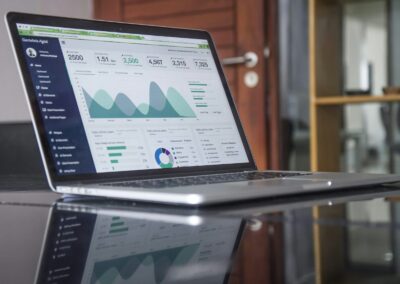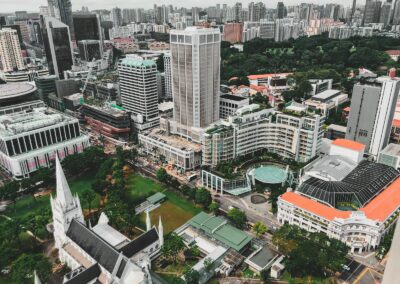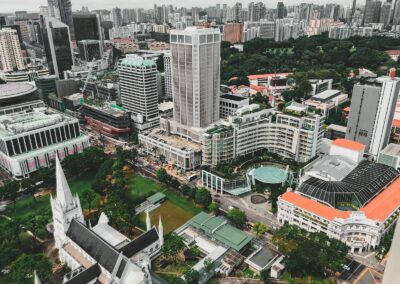Harnessing Real-Time Data for Efficient Resource Management
Transforming Urban Resource Management with Real-Time Data
The integration of real-time data in smart city initiatives is a transformative approach that significantly optimizes resource management and reduces environmental impact, particularly in forward-thinking regions like Saudi Arabia and the UAE. Cities such as Riyadh and Dubai are pioneering the use of advanced technologies like Artificial Intelligence (AI), the Internet of Things (IoT), and data analytics to monitor and manage resources more effectively. Real-time data collection and analysis allow city planners to make informed decisions that enhance efficiency and sustainability.
In Riyadh, for instance, AI-driven systems analyze data from IoT sensors placed throughout the city to monitor water usage, energy consumption, and waste generation. This continuous flow of information enables city officials to identify inefficiencies and implement corrective measures promptly. Similarly, in Dubai, real-time data from smart meters and environmental sensors help manage energy grids, ensuring that supply meets demand while minimizing waste and reducing carbon emissions.
Moreover, the use of blockchain technology enhances the transparency and security of data transactions. Blockchain ensures that all data collected is tamper-proof and accurately recorded, fostering trust among stakeholders. This technology is particularly useful in managing shared resources, as it provides a clear and immutable record of usage and contributions. By leveraging real-time data and blockchain, cities in Saudi Arabia and the UAE can create more resilient and sustainable urban environments.
Enhancing Environmental Sustainability through Real-Time Data
Real-time data plays a crucial role in enhancing environmental sustainability in smart cities. By providing continuous monitoring of environmental parameters, such as air quality, noise levels, and water pollution, real-time data allows for immediate action to mitigate negative impacts. In cities like Riyadh and Dubai, this data-driven approach supports initiatives aimed at reducing the urban carbon footprint and promoting green living.
AI-powered analytics can predict environmental trends and assess the effectiveness of sustainability initiatives. For example, in Dubai, AI models analyze data from air quality sensors to predict pollution levels and recommend traffic management strategies to reduce emissions. This proactive approach ensures that environmental policies are based on accurate and current data, leading to more effective interventions.
Additionally, real-time data supports the efficient management of natural resources. In Saudi Arabia, where water scarcity is a significant concern, real-time monitoring of water usage helps in identifying leaks and optimizing distribution. This not only conserves water but also reduces the energy required for water treatment and pumping, contributing to overall sustainability. By integrating real-time data into their operations, smart cities in Saudi Arabia and the UAE can enhance their environmental stewardship and ensure a healthier living environment for their residents.
Driving Business Success with Real-Time Data
The use of real-time data in smart city initiatives also offers substantial benefits for businesses, particularly in the areas of operational efficiency and strategic planning. For business executives, mid-level managers, and entrepreneurs in Saudi Arabia and the UAE, access to real-time data can provide valuable insights that drive decision-making and innovation. By leveraging this data, businesses can optimize their resource use, reduce costs, and improve their environmental performance.
Effective communication and leadership skills are essential for harnessing the potential of real-time data. Executive coaching services can help leaders understand the strategic value of data-driven decision-making and develop the skills needed to lead their organizations through digital transformation. By fostering a culture of data-driven innovation, businesses can enhance their competitiveness and sustainability.
Management consulting firms play a pivotal role in helping businesses integrate real-time data into their operations. These consultants provide expertise in change management, project management, and technology implementation, ensuring that data initiatives are aligned with business goals and executed effectively. In the long run, businesses that embrace real-time data will be better positioned to respond to market demands, regulatory requirements, and sustainability challenges.
In conclusion, the integration of real-time data in smart city initiatives is crucial for optimizing resource management and reducing environmental impact. By leveraging advanced technologies like AI, IoT, and blockchain, cities like Riyadh and Dubai are setting new standards for efficiency and sustainability. As these cities continue to innovate, the use of real-time data will be essential for creating resilient, livable urban environments that benefit both residents and businesses.
#SmartCities #RealTimeData #ResourceManagement #EnvironmentalImpact #AI #Blockchain #Dubai #Riyadh #UAE #SaudiArabia























